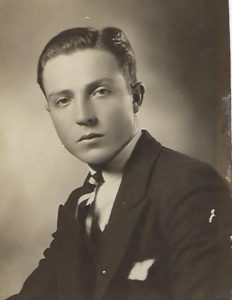Daddy

I stopped buying Father’s Day cards when I was twenty-three. When the holiday rolled around that year, I considered for the first time what people do who have no one to buy a card for. After mulling it over for several days, I decided to buy one for my uncle, my father’s younger brother. It said, “To A Wonderful Uncle on Father’s Day.” I figured Daddy would have approved.
He died the day before my twenty-third birthday. He’d been in the hospital for two weeks, and only my mother knew that he wasn’t coming home. My mother, my sister, and I had just left the ICU where we’d sat with the unconscious shell of him the way we did every day. We were headed for the parking lot, when a nurse called us back. He’s just taken a turn, she said. We’ve thought he was going to pass all day, she said. He was just waiting for you to come and say goodbye, she said. As soon as you walked out, he went.
I tell myself that after forty-five years, I can still remember him. I tell myself that my memories go deeper than remembering that November 10 is his birthday or August 2 is the day he died or that he smoked Camel cigarettes or that he was buried in the brown suit that he’d owned for only one month or that we put yellow roses on his coffin because my sister, ever the bossy know-it-all, thought he liked yellow ones best.
One of my most vivid memories is lying on a blanket with him and my sister in the backyard on balmy August nights, staring up the stars. His weekend wear consisted of a white T-shirt and khaki pants, a break from the suits his job required all week. The faint odor of tobacco smoke always clung to him, mixed with the scent of Dial soap and Old Spice aftershave and a trace of what my sister and I would later learn was the cheap, sickly sweet-sour bourbon that would eventually kill him.
He had a soft voice that never lingered long over the letter “r”. He once spent an entire evening schooling my sister and I to say “cha-uh” instead of “cheer.” He was born on a very small, poor farm in upper East Tennessee in a town that he called a “wide place in the road.” Yet, somehow he escaped the Appalachian twang that calls a “fire” a “far” and a “tire” a “tar.” He was the first member of his family to graduate from college. He was a math and science whiz and incredibly bright.
We’d lie on the blanket at night and stare up at that vast black sky, and he’d point to the Big Dipper and the Little Dipper and tell us how to find the North Star. He’d insist that anyone who could find the North Star could find his way home. We’d beg him to tell stories, and he would tell us about growing upon the farm. He would talk about hunting and fishing, and his dogs. He would never mention being too poor to have an inside bathroom or going to school in a one-room schoolhouse. Even though he told the same stories over and over, we never grew tired of them. We had our favorites that we’d beg him to repeat. They were like jewels that he’d take out in the dark and polish in the starlight, nuggets of family history that only he could pass on to us.
We stopped lying on the blanket, watching the stars on summer nights by the time that I was eleven. Daddy still did all the things for “his girls” that made me, in particular, feel special. A red candy heart at Valentines. A wrist corsage of pink roses for Easter. A small gift whenever he came back from a business trip. But he had old secrets and old wounds that I was too young to understand that ate at him. As the years went by, the cheap bourbon changed him, and the bottles that he’d bring home in the brown paper bags became more important to him than lying on the blanket finding the North Star. The pain of his past was too great and he lost his way, despite knowing that our love for him was always his North Star.





